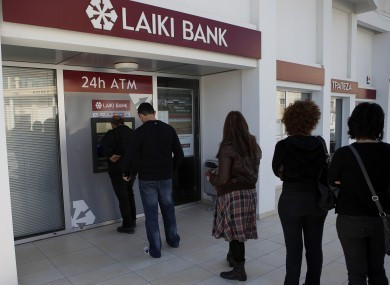Cypriots Hit by 10% Savings Tax to Pay for EU Bailout Deal

A run on the banks in Cyprus is feared after the island's government agreed a one-off tax of up to 10 percent on customers' savings as part of a bailout deal with the EU.
Eurozone finance ministers agreed to the unprecedented tax on bank deposits as officials unveiled a €10 billion (£8.65bn) rescue plan for the country, the fifth since Europe's debt crisis erupted in 2009.
In the Cypriot capital of Nicosia, queues tailed back from cash machines across the city as angry customers opted to withdraw their funds.
Cypriots with less than €100,000 in their accounts will have to pay a one-off levy of 6.75 percent, Eurozone officials said. Those with more will lose 9.9 percent.
Cypriot bank officials said depositors could access all of their money except the amount set by the levy.
The levy itself will not take effect until Tuesday, following a public holiday, but action is being taken to curb electronic money transfers over the weekend.
Cyprus is the fifth country after Greece, the Republic of Ireland, Portugal and Spain to turn to the eurozone for financial help during the region's debt crisis.
The levy is supposed to function as a caution to bank lenders to avoid depositing funds in overstretched banks.
While Cyprus is the third-smallest of the Eurozone economies, the move could signal repercussions for other much larger economies which have also overstretched themselves, such as Spain and Italy.
Cyprus has been in severe financial difficulty since the collapse of the Greek economy, where its own banks had huge investments.
Co-operative banks, which usually open on Saturday in Cyprus, were closed after long queues formed of people withdrawing their money.
Maria Zembyla, from Nicosia, said the levy would make a "big dent" in her savings and "erode the investor confidence".
"Russians that currently keep the economy afloat will leave the country along with their money," she said.
About half of the island's depositors are thought to be non-resident Russians. European authorities believe vast amounts of cash held in Cypriot banks belong to Russian money launderers.
Speculation has mounted that Russia could help finance the bailout by extending a €2.5bn loan to Cyprus.
"My understanding is that the Russian government is ready to make a contribution with an extension of the loan and a reduction of the interest rate," said Olli Rehn, Vice President of the European Commission.
Cypriot finance minister Michael Sarris will travel to Moscow for meetings on Monday. He said the plan was the "least onerous" of the options Cyprus faced to stay afloat.
"It's not a pleasant outcome, especially of course for the people involved," said Sarris. Cypriot President Nicos Anastasiades, who was elected last month on a pledge to tackle the debt crisis, will address the nation on Sunday, when the Cypriot parliament will vote on the proposals.
© Copyright IBTimes 2025. All rights reserved.





















